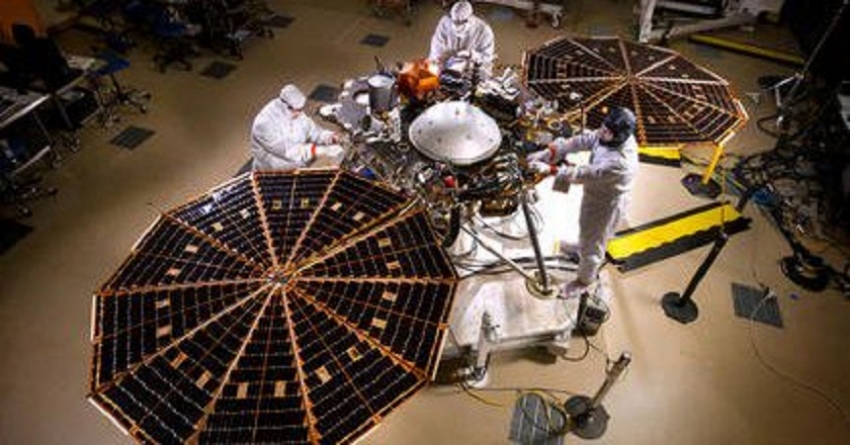Mission Control at NASA's Jet Propulsion Laboratory exploded into celebratory applause and cheers after the touchdown was confirmed. The landing was watched around the world and even broadcast live on the Nasdaq Stock Market tower in New York City's Times Square.
During a post-landing NASA press conference, the astronauts on the International Space Station called down to congratulate the mission team and said they "got some goosebumps" watching the coverage.
NASA celebrates the InSight landing on Mars.
NASA celebrates the InSight landing on Mars.
"Today, we successfully landed on Mars for the eighth time in human history," NASA Administrator Jim Bridenstine said. "InSight will study the interior of Mars and will teach us valuable science as we prepare to send astronauts to the Moon and later to Mars. This accomplishment represents the ingenuity of America and our international partners, and it serves as a testament to the dedication and perseverance of our team. The best of NASA is yet to come, and it is coming soon."
Bridenstine said that Vice President Mike Pence called to congratulate the entire team.
InSight, or Interior Exploration using Seismic Investigations, Geodesy and Heat Transport, is going to explore a part of Mars that we know the least about: its deep interior. It launched May 5. InSight will spend two years investigating the interior where the building blocks below the planet's surface recorded its history.
To reach Mars, InSight cruised 301,223,981 miles at a top speed of 6,200 miles per hour in space, followed by two cube satellites. The suitcase-size spacecraft, called MarCO, are the first cube satellites to fly into deep space. MarCO shared data about InSight when it entered the Martian atmosphere for the landing.
ludes the dust cover still on the lens, which will be removed this week. The black specks are dust, and there's a rock in the left foreground. To the right is one footpad of the lander.
MarCO-B took this image of Mars from about 4,700 miles away.The MarCO cube satellites also bid farewell to InSight after it landed and their own mission ended. MarCO-B took an image of Mars from 4,700 miles away during its flyby at 3:10 p.m. ET after helping to establish communications with mission control about the landing.
The landing
InSight robotically guided itself through the landing. The landing itself is a tricky maneuver. NASA engineers don't call it "seven minutes of terror" for nothing. In less time than it takes to hard-boil an egg, InSight slowed from 12,300 mph to 5 mph before it gently landed on the surface of Mars, according to NASA.
"While most of the country was enjoying Thanksgiving with their family and friends, the InSight team was busy making the final preparations for Monday's landing," said Tom Hoffman of JPL, InSight's project manager. "Landing on Mars is difficult and takes a lot of personal sacrifices, such as missing the traditional Thanksgiving, but making InSight successful is well worth the extraordinary effort."
Countdown to Mars: NASA sweating 'seven minutes of terror' Only 40% of missions sent to the Red Planet by any agency have been successful. Part of this is due to the thin Martian atmosphere, which is only 1% of Earth's, so there's nothing to slow something trying to land on the surface.
Like the Phoenix spacecraft, InSight had a parachute and retro rockets to slow its descent through the atmosphere, and three legs suspended from the lander absorbed the shock of touching down on the surface.But the engineers prepared the spacecraft to land during a dust storm if need be.About 20 minutes before landing, InSight separated from the cruise stage that helped bring it all the way to Mars and turned to position itself for entering the atmosphere.




















